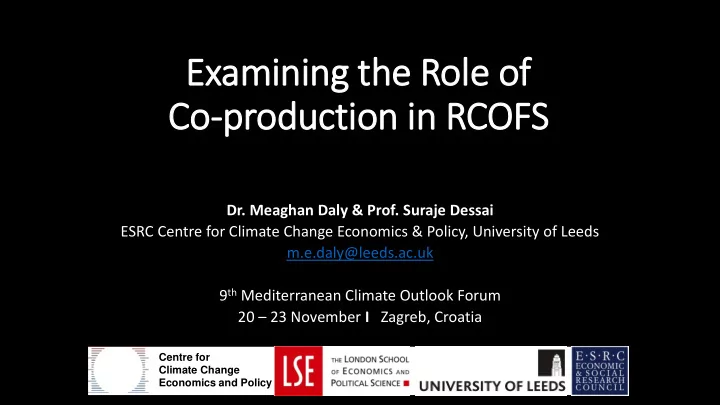

Examining the Role of Co Co-production in in RCOFS Dr. Meaghan Daly & Prof. Suraje Dessai ESRC Centre for Climate Change Economics & Policy, University of Leeds m.e.daly@leeds.ac.uk 9 th Mediterranean Climate Outlook Forum 20 – 23 November I Zagreb, Croatia Centre for Climate Change Economics and Policy
Project Background • Centre for Climate Change Economics & Policy • A joint centre based at University of Leeds & London School of Economics • Funded by the U.K. Economic & Social Science Research Council • Two-year project – October 2016 – September 2018 • Scoping and consultation with WMO to inform design 2
Examining Co-production in RCOFs Why RCOFs? • Regional climate outlook forums (RCOFs) one of earliest efforts to disseminate climate forecasts • Site of interaction between scientists and users • Key element of User Interface Platform & Climate Information Services Information System under the GFCS 3
Future Research: Examining Co-production in RCOFs There has not yet been a comprehensive study to compare lessons and learning about co-production of knowledge across RCOFs • How are users engaged within co-production processes? Who participates? • What are producers’ and users’ views about the RCOF process? • What are similarities and differences in user engagement across regions? What can we learn from this? • How does user engagement within RCOFs currently influence the value of seasonal forecast information among various users or communities? • What does this tell us about how to improve co-production of climate services in the future? What are barriers / opportunities? 4
Overview of Research: Examining Co-production in RCOFs Phase 1: Scoping of RCOFs Globally – complete • Interviews with individuals involved in implementation or coordination of the RCOFs either at global or regional scales • Document analysis & review of literature • Participation in Global RCOF Review • To identify: goals, institutions, actors, processes, role of users / co-production Phase 2: Comparative Study of RCOFs – ongoing • Study of 3 RCOFs • Observation, interviews, online survey • To identify: lessons / learning about efforts to co-produce climate information across multiple RCOFs 5
Phase 2: Examining Co-production in RCOFs Comparative study of 3 RCOFs during 2017 • SASCOF – April 2017 • SARCOF – August 2017 • MEDCOF – November 2017 Mixed methods (quantitative and qualitative) approach: 1. Quantitative survey • Actors involved, user engagement, outcomes of co-production, etc. 2. Semi-structured interviews • Perspectives of co-production, how this adds value to RCOF products 3. Observation of RCOF events 6
What might your participation involve? 7
Outcomes of the Research • MedCOF Case Study Summary • To be delivered to the MedCOF Management Group • Academic Publications • Review Paper – Role of co-production in RCOFs • Cumulative Paper – Findings across three case studies • Presentation of Results • Presentation to WMO Secretariat • Presentation at RCOF meetings for all case studies 8
Future Research : Examining Co-production in RCOFs Linking learning from RCOFs to National Climate Outlook Forums • Need for an ‘intermediate’ step to translate the RCOF products into more specific information at national and sub-national scales • • Following regional comparative study, select 1 national case for study in 2018 / 19 • Goal: 1) examine how NCOFs add additional value to seasonal forecasts; 2) to understand and document how NCOFs are being implemented in practice 9
Thank you. Merci. Gracias. Questions? Meaghan Daly: m.e.daly@leeds.ac.uk Suraje Dessai: s.dessai@leeds.ac.uk Centre for Climate Change Economics and Policy 10
Recommend
More recommend